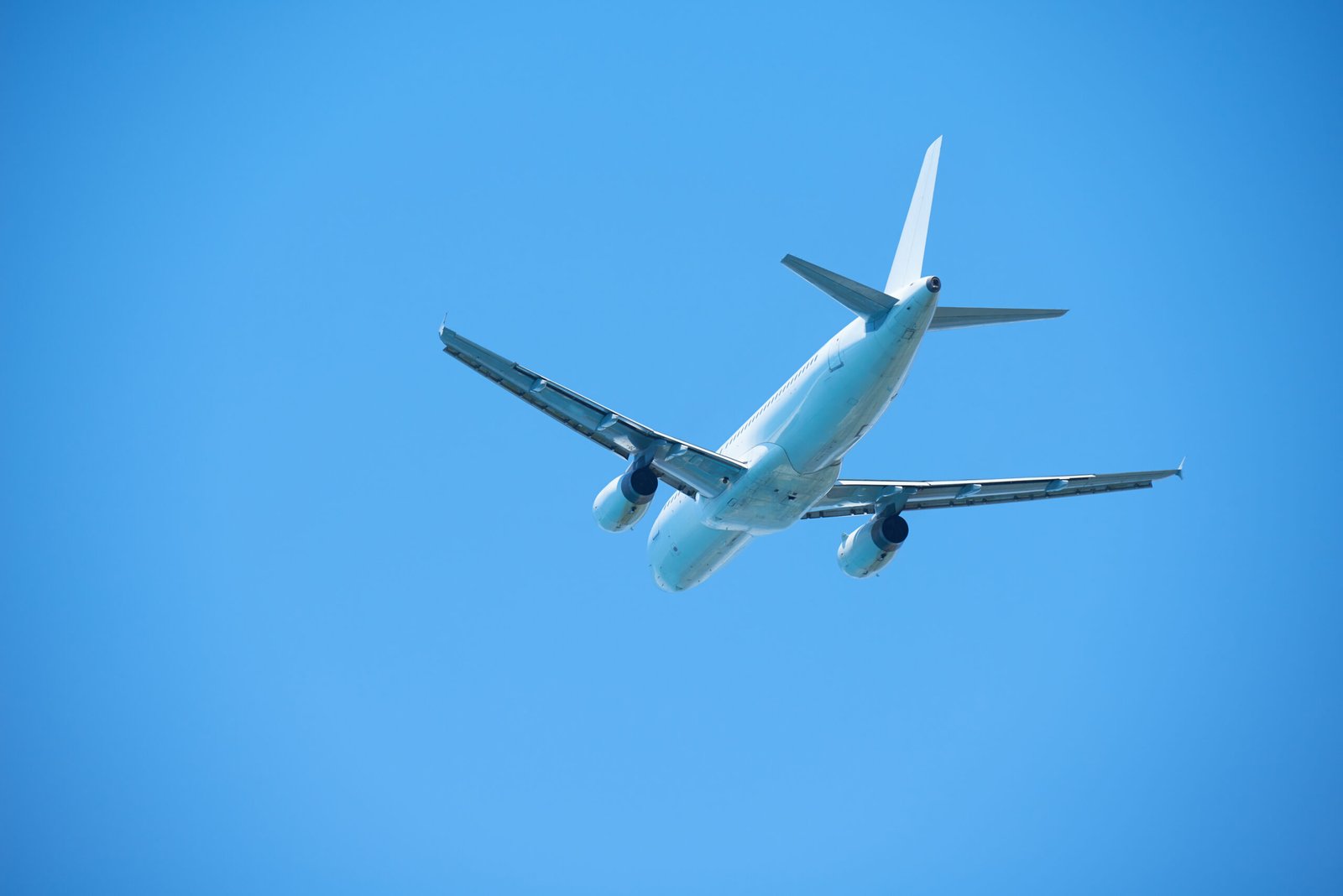Aviation Industry Trends
The Future of Flight: Innovations Shaping the Aviation Industry
As we soar into a new era of aviation, the sky is no longer the limit—it’s just the beginning. With technological advancements and innovative ideas taking flight, the aviation industry is undergoing profound transformations. From educational pathways to cutting-edge training tools, let’s explore how these developments are shaping the future of flight.
## Aviation Schools by Types of Courses
Education plays a pivotal role in preparing aspiring aviators for their careers. Various types of courses cater to different interests within this expansive field. For those keen on becoming pilots, traditional flight schools offer comprehensive programs that include ground school theory, practical flight training, and specialized certifications like Instrument Rating or Commercial Pilot License.
Meanwhile, aviation management courses focus on the business side of flying—covering topics like airport operations, regulatory compliance, and airline management. These programs equip students with skills essential for overseeing complex aviation enterprises.

For those intrigued by technology’s role in aviation, many institutions now provide courses in aeronautical engineering or drone technology. As unmanned aerial vehicles (UAVs) become more prevalent in both commercial and recreational airspace, knowledge in this area is increasingly valuable.
Finally, maintenance technician programs train individuals to ensure aircraft safety and performance through hands-on experience with engines and systems. The demand for skilled technicians continues to rise as fleets expand globally.
## Lists of Aviation Blogs, Websites, Social Media Sites
For enthusiasts eager to stay updated on industry trends or share insights with fellow aviators, numerous blogs and websites serve as excellent resources:
1. **AirlineReporter** – Focused on airline reviews and news.
2. **AvGeekery** – A captivating blog for aviation aficionados packed with stories from around the world.
3. **FlightGlobal** – Offers comprehensive news coverage on all things aviation-related.
4. **Simple Flying** – An accessible site that covers breaking news about airlines and aircraft.
5. **Pilot’s Digest** – Provides tips for pilots along with interesting articles about flying experiences.

Social media has also become an invaluable tool for connecting with fellow aviators. Platforms like Instagram showcase stunning aerial photography under hashtags like #aviationlovers or #aircraftspotting while Twitter serves as a rapid-fire news source where industry experts share updates using handles such as @AviationWeek or @FltPlan.
## FAA Flight Schools/Airplane-Schools/Simulators
The Federal Aviation Administration (FAA) recognizes various flight schools across the United States that adhere to rigorous safety standards and training protocols. Aspiring pilots can enroll in FAA-certified schools which provide structured curriculums designed to take them from novice flyers to seasoned aviators.
In addition to traditional classroom settings, simulators have revolutionized pilot training by offering realistic environments without leaving the ground. Modern flight simulators replicate almost every aspect of flying—from environmental conditions to cockpit instrumentation—allowing students to gain crucial experience before stepping into real aircraft.
Moreover, many innovative platforms are emerging that utilize virtual reality (VR) technology for immersive training experiences—making it possible for students to practice maneuvers safely and effectively from anywhere they choose.
## Conclusion
As we look ahead into the horizon of aviation innovation—from diverse educational opportunities to groundbreaking technologies—the future appears bright indeed! New generations of pilots will be equipped not only with superior skills but also an understanding of how emerging trends shape air travel’s landscape today—and beyond! Embracing these changes ensures a thrilling journey awaits us all in the skies above!
The Future of Flight: Innovations Transforming the Aviation Industry
As we soar into a new era of aviation, the landscape is evolving rapidly, driven by groundbreaking innovations and advancements. The future of flight is not only about sleek aircraft and high speeds; it’s also about training the next generation of aviators, sharing knowledge through various platforms, and harnessing technology to enhance safety and efficiency. Let’s delve into the different facets transforming this dynamic industry.
### Aviation Schools: A Spectrum of Courses
To navigate the skies effectively, aspiring pilots need comprehensive education tailored to their goals. Aviation schools offer a multitude of courses that cater to diverse interests and career paths.
1. **Private Pilot Training**: This foundational course introduces students to essential flying skills. It prepares them for private pilot certification, allowing them to fly solo or with passengers under specific regulations.
2. **Commercial Pilot Programs**: Once students obtain their private license, many opt for commercial training to gain professional piloting credentials. These programs provide advanced instruction on navigation, flight maneuvers, and operational procedures.
3. **Air Traffic Control (ATC) Training**: Not all aviation careers involve flying! ATC courses prepare individuals to manage air traffic safely and efficiently using cutting-edge technology.
4. **Aviation Management**: For those interested in the business side of aviation, management programs focus on airport operations, airline management, logistics, and regulatory compliance.
5. **Maintenance Engineering**: Recognizing the importance of aircraft upkeep, these technical courses equip students with skills needed for aircraft repair and maintenance—ensuring safety in every flight.
### A Wealth of Information: Aviation Blogs and Websites
In today’s digital age, staying informed is easier than ever thanks to a plethora of blogs, websites, and social media channels dedicated to aviation enthusiasts:
**Airline Reporter**: This blog covers industry news with a unique perspective on travel experiences.
**Flight Global**: An authoritative source for aviation news that keeps readers updated on global trends.
**The Points Guy (TPG)**: Focused on travel rewards strategies but rich in insights relevant to frequent flyers.
**AvGeekery**: A community-driven site where avid aviation fans share stories about their love for planes.
**YouTube Channels like Mentour Pilot**: Offering engaging video content that breaks down complex aviation concepts in an accessible way.
Social media platforms such as Instagram have taken flight too! Accounts like @aviationdaily showcase stunning aerial photography while Twitter handles like @FlightAware provide real-time tracking updates—keeping fans connected in real time.
### FAA Flight Schools & Simulators
For practical training grounded in safety standards, FAA-approved flight schools are vital stepping stones for aspiring pilots. These institutions adhere strictly to regulations set forth by the Federal Aviation Administration (FAA), ensuring quality education throughout various stages of pilot development.
Additionally, simulators have revolutionized pilot training over recent years. Advanced simulation technology allows students to experience realistic flying scenarios without ever leaving the ground! These systems replicate actual cockpit environments enabling learners to practice emergency procedures or hone specific maneuvers safely before taking off in real aircraft.
Simulators not only reduce costs associated with traditional flight hours but also permit learners endless opportunities for practice—an invaluable resource as they prepare for licensing exams or further certifications.
### Conclusion
The future of aviation gleams bright with innovation at its helm—from diverse educational pathways nurturing talent across various sectors within the industry to technological advancements redefining how we train pilots and share information. As we embrace these changes together as enthusiasts or professionals alike—one thing remains certain; our passion for flight will continue soaring toward new horizons!

Wings of Change: How Aviation is Evolving in a Post-Pandemic World
The aviation industry, once grounded by the pandemic, is now soaring into an era of transformation. As we emerge from the shadows of COVID-19, aviation schools are adapting to new demands and trends. From traditional pilot training to innovative courses in drone technology, the landscape has never been more diverse or exciting.
*Aviation Schools: A Spectrum of Courses**
One notable shift is the diversification of educational offerings. Prospective aviators can choose from a variety of programs tailored to meet different career aspirations. Here’s a breakdown of some types:
1. **Pilot Training Programs**: These remain foundational for anyone pursuing a career as a commercial or private pilot. Students learn everything from basic flight maneuvers to advanced navigation skills.
2. **Air Traffic Control Courses**: With air traffic increasing again, these programs focus on teaching students how to manage and direct aircraft safely and efficiently.
3. **Aerospace Engineering Degrees**: For those inclined toward design and innovation, these degrees cover everything from propulsion systems to materials science, preparing students for roles in aircraft manufacturing.
4. **Drone Technology Programs**: As drones find applications in various sectors—from delivery to agriculture—many schools now offer specialized training for aspiring drone operators and technicians.
5. **Airport Management Studies**: These courses cover operations management at airports, focusing on logistics, security protocols, and customer service strategies essential for modern airports.
With such a range available, students have unprecedented opportunities to tailor their education to their interests and the evolving job market.
*Discovering Online Resources**
In today’s digital age, staying informed about aviation trends is crucial—and there’s no shortage of resources out there! Here are some popular blogs and websites that offer valuable insights:
**AirlineReporter.com**: This blog covers airline news and reviews with an engaging personal touch.
**FlyingMag.com**: Known for its comprehensive articles on flying techniques as well as gear reviews.
**Plane & Pilot Magazine (planeandpilotmag.com)**: Offers expert advice on all things related to piloting.
**The Points Guy (thepointsguy.com)**: Focuses on travel tips related to frequent flyer programs and maximizing travel rewards.
Social media platforms also play an essential role in keeping enthusiasts connected:
Follow accounts like @aviationdaily on Twitter for real-time updates.
Instagram handles such as @airplanesdaily showcase breathtaking aerial photography.
Communities formed around hashtags like #AvGeek unite fans across platforms like TikTok and Facebook!
*FAA Flight Schools & Simulators**
For aspiring pilots in the United States, FAA-accredited flight schools provide rigorous training that meets national standards. Institutions like Embry-Riddle Aeronautical University or ATP Flight School offer comprehensive curricula that include both classroom learning and hands-on flight experience.
Moreover, simulator technology has advanced significantly since 2020. High-fidelity simulators allow students not only to practice emergency scenarios but also gain invaluable experience without leaving the ground—a vital asset during times when flying was restricted.
As we navigate through this post-pandemic reality, it’s clear that aviation education is embracing change while maintaining its core mission—training skilled professionals who will take us into the skies of tomorrow! The future looks bright as new technologies emerge alongside dedicated individuals eager to transform our world through flight. Whether you’re just starting your journey or looking to specialize further down your path; now is an exhilarating time within aviation!

Soaring High: The Future of Aviation Technology
As the aviation industry continues to evolve, driven by advancements in technology and a growing demand for skilled professionals, it’s essential to explore the educational pathways that shape tomorrow’s aviators. Whether you’re dreaming of becoming a pilot, an air traffic controller, or an aerospace engineer, various aviation schools offer specialized courses tailored to your aspirations.
*Types of Aviation Courses**
Aviation schools provide a plethora of options for students interested in pursuing careers in this dynamic field. Traditional flight training programs dominate the landscape, focusing on pilot certifications ranging from private pilot licenses (PPL) to commercial and airline transport pilot licenses (ATPL). These programs usually combine hands-on flight training with ground school instruction.
On the other hand, if you’re inclined towards engineering or technology, many institutions offer degree programs in aerospace engineering. These courses delve into aircraft design, propulsion systems, and avionics — crucial components that contribute to safer and more efficient flying experiences.
For those interested in managing airport operations or working within regulatory frameworks, aviation management programs are available as well. These cover topics like logistics, finance, and safety regulations within the aviation sector. Additionally, specialized certifications in unmanned aerial vehicles (UAVs) or drone technology have emerged recently due to their skyrocketing popularity.

*Key Resources: Aviation Blogs and Websites**
Staying updated with industry trends is vital for aspiring aviation professionals. Numerous blogs and websites provide insights, news updates, and expert opinions:
1. **Airline Reporter** – This site offers news about airlines along with reviews of new aircraft.
2. **AvGeekery** – A blog dedicated to aviation enthusiasts featuring articles on aircraft history and culture.
3. **Flying Magazine** – Covering everything from piloting tips to aviation gear reviews.
4. **AOPA (Aircraft Owners and Pilots Association)** – A trusted resource for pilots offering advocacy resources and flight school directories.
5. **Flight Global** – Provides comprehensive coverage of global aviation news.
Social media also serves as a fantastic platform for connecting with fellow enthusiasts. Twitter accounts like @AviationWeek keep you informed about breaking developments while Instagram pages such as @aircraftspotting showcase stunning images from around the world.
*FAA Flight Schools & Simulators**
When it comes to obtaining your pilot license or enhancing your flying skills through simulation training, FAA-certified flight schools are indispensable. These institutions adhere strictly to federal regulations ensuring high-quality standardization across training programs.
In addition to traditional flight schools like Embry-Riddle Aeronautical University or Purdue University’s College of Aviation Technology, many local flying clubs offer hands-on experience at more affordable rates. Furthermore, simulators play an increasingly significant role in modern flight training; they allow students not only to log hours but also practice emergency procedures without leaving the ground.
By integrating advanced software that mimics real-world flying conditions closely — think turbulence effects or instrument failures — these simulators prepare future pilots for diverse scenarios they’ll encounter once airborne.
In conclusion, as we look ahead at what lies beyond our current horizon in aviation technology—be it electric planes reducing carbon footprints or autonomous drones revolutionizing deliveries—the foundation laid by robust educational paths will be essential for preparing skilled individuals capable of navigating this exciting future landscape! So whether your passion lies in piloting aircraft soaring through endless skies or developing cutting-edge technologies behind the scenes—the sky truly is no longer the limit!
Eco-Friendly Aviation: How the Industry is Tackling Climate Change
In recent years, the aviation sector has found itself at a crucial crossroads, balancing the demands of a booming travel industry with an urgent need to address climate change. As eco-consciousness rises among travelers and regulatory bodies alike, innovations in technology and education are paving the way for a greener future. This blog post explores how various aviation schools are shaping tomorrow’s pilots and engineers while highlighting essential resources for anyone looking to stay informed about developments in eco-friendly aviation.
Aviation schools today offer a diverse array of courses designed to equip students with the skills necessary for this rapidly evolving industry. These institutions specialize in multiple areas including flight training, aircraft maintenance, air traffic control, and aviation management.
1. **Flight Training Programs:** Aspiring pilots can choose from private pilot licenses to commercial licenses, often incorporating advanced training on fuel-efficient flying techniques that minimize carbon footprints.
2. **Aircraft Maintenance Courses:** Understanding how to maintain aircraft sustainably is vital. Many programs now emphasize green practices in repair and upkeep.
3. **Air Traffic Control Education:** Training future air traffic controllers involves not just managing traffic but doing so efficiently to reduce waiting times and unnecessary emissions.
4. **Aviation Management Degrees:** These programs focus on sustainable operations within airlines and airports, equipping leaders with strategies for implementing eco-friendly policies.
To further enrich your knowledge about eco-friendly initiatives within aviation, numerous blogs and websites provide valuable insights into these transformative changes:
**The Air Current:** Focused on data-driven analysis, this site covers emerging technologies aimed at reducing environmental impacts.
**GreenAir Online:** A dedicated platform discussing news related to sustainable aviation fuels (SAFs) and innovative practices across the industry.
**Simple Flying:** A popular blog that regularly features articles on airlines’ sustainability efforts alongside updates on new fleet technologies.
Social media is also an excellent resource for staying connected with thought leaders in eco-friendly aviation:
On Twitter, follow accounts like @SustainableAvia for real-time updates on advancements in sustainable flying.
LinkedIn groups such as “Aviation Green Initiative” bring together professionals focused on environmental solutions within aerospace.
For those eager to turn their passion into action or simply explore potential career paths in aviation while being environmentally conscious, finding FAA-approved flight schools is essential. The Federal Aviation Administration (FAA) provides a comprehensive list of accredited flight training organizations across the country.
*Top FAA Flight Schools:**
1. **Embry-Riddle Aeronautical University** – Renowned for its commitment to innovation in aeronautics education and research.
2. **University of North Dakota** – Offers state-of-the-art simulators integrated into their curriculum focusing on efficiency and safety.
3. **Florida Institute of Technology** – Known for its cutting-edge programs that incorporate sustainability topics directly into pilot training.
Moreover, many flight schools are adopting simulation technology as part of their curriculum—a move that not only enhances learning but also conserves resources by reducing fuel consumption during initial training phases.
As we look towards the horizon of aviation’s future amidst rising environmental concerns, it’s clear that educational institutions play a pivotal role in shaping eco-conscious professionals who will lead this transformation. By investing time in understanding both traditional methods and innovative solutions within aviation education—coupled with following influential platforms—the journey toward more sustainable skies becomes increasingly attainable.
In conclusion, eco-friendly aviation isn’t merely an aspiration; it’s becoming an integral part of pilot training and industry practices worldwide. With ongoing advancements fueled by education and awareness, we can all contribute towards making our skies cleaner one flight at a time!





